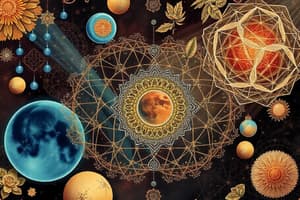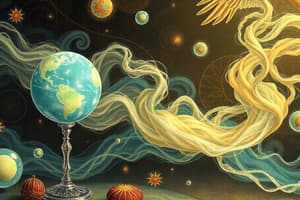Podcast
Questions and Answers
Which property is characteristic of solids?
Which property is characteristic of solids?
- Take the shape of their container
- Have particles that move freely
- Have a variable density
- Have a definite shape and volume (correct)
What distinguishes liquids from gases?
What distinguishes liquids from gases?
- Liquids have a definite volume but gases do not (correct)
- Liquids are less dense than gases
- Liquids can be compressed more than gases
- Liquids have a fixed shape
Which of the following is NOT an example of a solid?
Which of the following is NOT an example of a solid?
- Ice
- Oil (correct)
- Metal
- Wood
Which gas is most abundant in the atmosphere?
Which gas is most abundant in the atmosphere?
What is true about the density of gases compared to solids and liquids?
What is true about the density of gases compared to solids and liquids?
Which of the following accurately describes a physical change?
Which of the following accurately describes a physical change?
What is required for a chemical reaction to occur?
What is required for a chemical reaction to occur?
Which property can be observed without changing the identity of the substance?
Which property can be observed without changing the identity of the substance?
What does the principle of Conservation of Mass state?
What does the principle of Conservation of Mass state?
Which of the following is NOT an indicator of a chemical reaction?
Which of the following is NOT an indicator of a chemical reaction?
What is a characteristic of a compound?
What is a characteristic of a compound?
Which of the following best defines a molecule?
Which of the following best defines a molecule?
Which of the following statements about scientific reasoning is true?
Which of the following statements about scientific reasoning is true?
Flashcards are hidden until you start studying
Study Notes
States of Matter
- Matter exists in three primary states: solids, liquids, and gases, characterized by distinct properties.
- Solids have a definite shape and volume due to particles being closely packed, allowing them to maintain their form.
Examples of Solids
- Ice: Solid form of water that maintains its shape until melting.
- Wood: Rigid natural material used in construction and furniture.
- Metal: Strong materials like iron and aluminum used across various applications.
Properties of Liquids
- Liquids have a definite volume but take the shape of their container, with particles less tightly packed than in solids, enabling flow.
Examples of Liquids
- Water: The most prevalent liquid essential for life, found in rivers, lakes, and oceans.
- Oil: A viscous liquid utilized in cooking and industrial processes.
- Mercury: Unique liquid metal used in thermometers.
Characteristics of Gases
- Gases lack a definite shape and volume; particles are dispersed and move freely, filling available space.
Examples of Gases
- Oxygen: Essential gas for respiration, present in the atmosphere.
- Carbon Dioxide: Produced during respiration and combustion, crucial for photosynthesis.
- Nitrogen: The most abundant atmosphere gas, important for biological processes.
Key Terms
- Matter: Anything with mass that occupies space.
- Chemical Reaction: Interaction of substances to form new substances.
- Physical Change: Alteration that does not create a new substance, such as state change.
Properties of Matter
- Characteristics observable or measurable without altering substance identity, including:
- Density
- Melting point
- Boiling point
- Solubility
- Flammability
- Odor
Chemical Reactions
- Reactants: Initial substances in a reaction.
- Products: Substances formed post-reaction.
- Conservation of Mass: Mass is neither created nor destroyed during chemical processes.
Indicators of Chemical Reactions
- Color change
- Gas production
- Temperature change
- Precipitate formation
Scientific Concepts
- Data Analysis: Process of inspecting, cleaning, and transforming data to extract information.
- Scientific Reasoning: Drawing conclusions using logic and evidence.
- Patterns: Regular occurrences in nature or data.
Interactions and Composition
- Molecule: Group of atoms bonded together.
- Atom: Basic unit of matter with a nucleus and surrounding electrons.
- Element: Pure substance consisting of a single type of atom.
- Compound: Substance made from two or more different elements chemically combined.
Studying That Suits You
Use AI to generate personalized quizzes and flashcards to suit your learning preferences.




